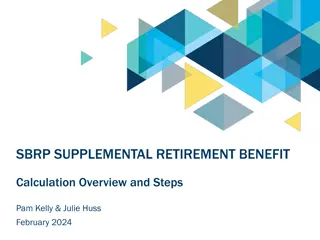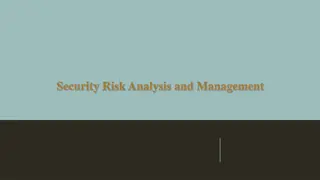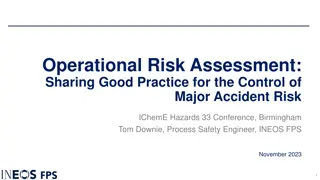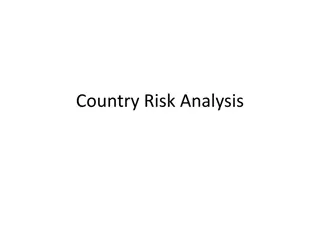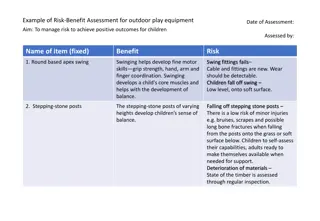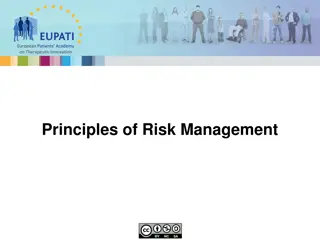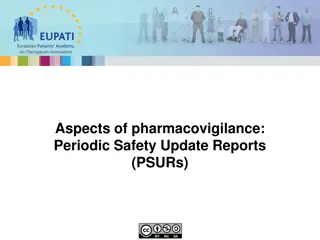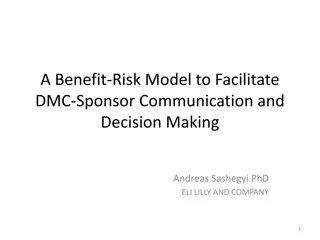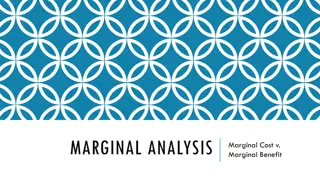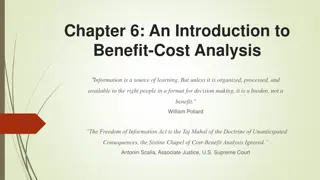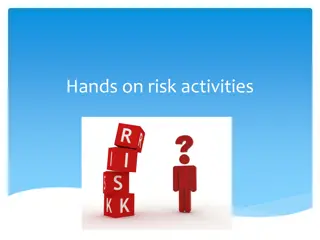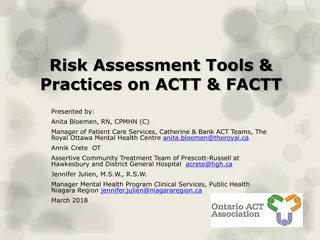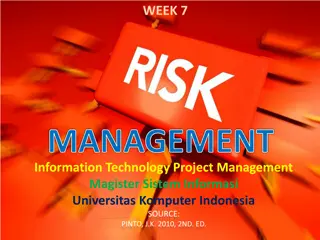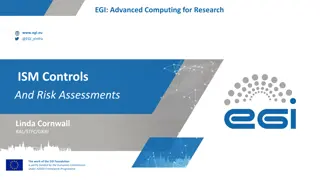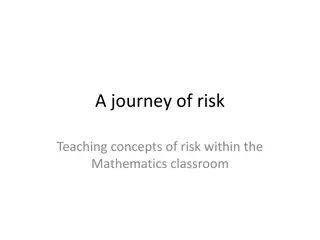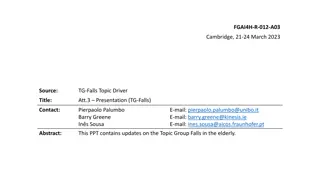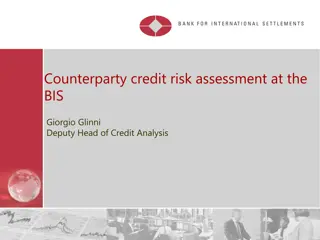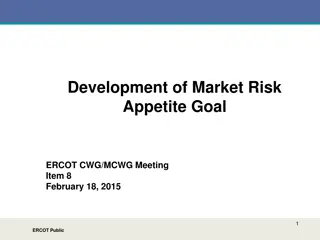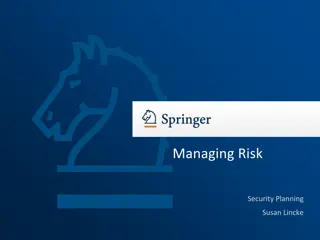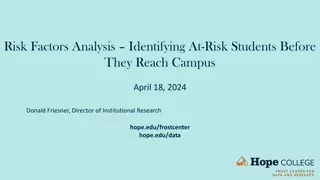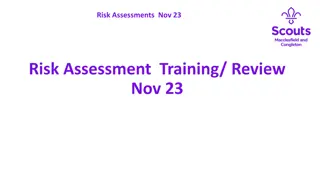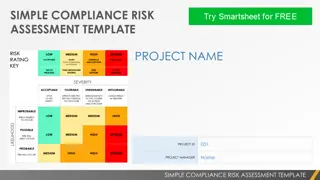SBRP SUPPLEMENTAL RETIREMENT BENEFIT
Supplementation retirement benefit (SBRP) is a defined benefit providing lifetime income separately managed by SBCTC. Eligibility requirements include age, years of service, and disability retirement provisions. Calculations are complex and based on retirement age, years of service, goal income, and
0 views • 26 slides
Comprehensive Overview of Security Risk Analysis and Management
Explore the essential aspects of security risk analysis and management, including risk identification, assessment, and control techniques within an Information Security (InfoSec) context. Learn about the purpose of risk management, steps involved in a risk management plan, asset identification and c
0 views • 22 slides
Understanding Risk Management in Environmental Geography and Disaster Management
Risk management in environmental geography and disaster management involves assessing the potential losses from hazards, evaluating vulnerability and exposure, and implementing strategies to mitigate risks. It includes calculating risk, dealing with risk through acceptance, avoidance, reduction, or
1 views • 10 slides
Introduction to Flood Risk Assessment with HEC-FDA Overview
This presentation delves into flood risk assessment using HEC-FDA software, covering topics such as defining flood risk, components of uncertainty, consequences of flood risk, and methods to assess flood risk including hydrology, hydraulics, geotechnical, and economics. It explores the intersection
6 views • 39 slides
Overview of DSW End Point Assessment Team Leader Level 3
DSW End Point Assessment Team Leader Level 3 provides a clear understanding of the assessment process, ensuring individuals comprehend why and when it occurs, responsibilities involved, and how DSW supports them. It covers topics such as what End Point Assessment entails, assessment design and deliv
1 views • 18 slides
Operational Risk Assessment for Major Accident Control: Insights from IChemE Hazards 33 Conference
This content provides valuable insights into the importance of Operational Risk Assessment (ORA) in managing major accident risks in high hazard industries. It covers the necessity of ORA, identifying changes, risk assessment, and key success factors. Real-life examples like the Buncefield Terminal
0 views • 22 slides
Understanding Agricultural Risk Management in the Face of Natural Disasters
Exploring the impact of natural disasters on agricultural economics, this content delves into the challenges faced by farmers and the approaches available for managing risks. From analyzing the Billion-Dollar Disasters in the US to discussing private and public risk management provisions, the conten
3 views • 20 slides
Understanding Country Risk Analysis in International Business
Country risk analysis is crucial for multinational corporations (MNCs) to assess the potential impact of a country's environment on their financial outcomes. It includes evaluations of political and economic risks in foreign operations. Sovereign risk, political risk characteristics, and factors are
1 views • 61 slides
Enhancing Zoonotic Disease Risk Communication in Public Health Emergencies
Explore the significance of adopting a One Health approach to zoonotic disease risk assessment and communication in the context of emergency health situations. The session emphasizes core capacities required by the International Health Regulations (IHR) 2005, effective risk communication processes,
2 views • 13 slides
Risk-Benefit Assessment for Outdoor Play Equipment
This risk-benefit assessment evaluates various outdoor play equipment, including swings, stepping stones, artificial grass, sandpit, trees, basketball net, and doors, by weighing the benefits they offer against the associated risks. Each item is assessed for its benefits such as developing motor ski
0 views • 12 slides
Project Risk Management Fundamentals: A Comprehensive Overview
Project risk management involves minimizing potential risks and maximizing opportunities through processes such as risk management planning, risk identification, qualitative and quantitative risk analysis, risk response planning, and risk monitoring and control. Quantitative risk analysis assesses t
0 views • 41 slides
Principles of Risk Management in Therapeutic Innovation
European Patients Academy emphasizes the importance of risk management in therapeutic innovation. Understanding the balance between benefits and risks, implementing risk management strategies for all medicines, and identifying different types of risks are crucial for ensuring patient safety and publ
0 views • 13 slides
Understanding Periodic Safety Update Reports (PSURs) in Pharmacovigilance
Periodic Safety Update Reports (PSURs) are essential pharmacovigilance documents that evaluate the benefit-risk balance of medicinal products post-authorization. These reports are submitted by Market Authorization Holders (MAH) at specified intervals to ensure the ongoing safety and efficacy of medi
3 views • 5 slides
Comprehensive Overview of Information Security Risk Assessment
Explore the agenda, strategies, frameworks, and resources related to effectively assessing information security gaps and risks in this detailed session. Learn about information risk, risk assessment goals, CIS resources, and the Duty of Care Risk Analysis Standard (DoCRA). Discover the importance of
0 views • 26 slides
Pennsylvania Risk Assessment: A Comprehensive Overview
This document explores the Pennsylvania risk assessment process, focusing on factors, techniques, and writing effective summaries. It covers learning objectives, agenda details, and the Pennsylvania Model Risk Assessment Form. Key points include understanding risk factors, making objective judgments
2 views • 8 slides
Protecting Your Business with Key Person Cover from Fidelity Life
Key Person Cover from Fidelity Life provides financial protection for businesses by helping replace key staff members unable to work due to sickness or injury. Established businesses and newly self-employed individuals can benefit from this cover, with options for benefit amounts, waiting periods, a
0 views • 12 slides
Effective Communication and Decision Making in Clinical Trials
Explore the challenges faced by Data Monitoring Committees (DMCs) in communicating emerging benefit-risk assessments to sponsors without revealing study results. Learn about the importance of conveying key trial data to sponsors for informed decision-making while maintaining study blinding. Discover
0 views • 18 slides
Benefit Only/Shell Agency Benefit Coordinator Overview
This overview provides insights into the Benefit Only/Shell Agency benefit coordination process, covering topics such as new employee notifications, benefit enrollment processes, open enrollment, troubleshooting, and more. It also highlights the project timeline and scope for implementing Workday HC
0 views • 24 slides
Understanding Marginal Analysis in Economic Decision-Making
Marginal analysis involves comparing Marginal Benefit with Marginal Cost to determine the optimal quantity for an activity. If Marginal Benefit is greater than Marginal Cost, there is a Net Marginal Benefit; if it's less, there's a Net Marginal Cost. The principle helps weigh costs and benefits befo
0 views • 14 slides
Overview of Benefit-Cost Analysis in Policy Decision Making
This chapter delves into benefit-cost analysis as an essential tool in policy evaluation. It outlines the steps involved in conducting a benefit-cost analysis, emphasizes the significance of defining and quantifying policy problems, and highlights the importance of identifying the seriousness of soc
0 views • 40 slides
Understanding Risk: Definitions and Concepts Explored
Delve into the world of risk with definitions ranging from baseline and absolute risk to relative risk, providing insights into how we perceive and manage uncertainties in various aspects of life. Explore the nuances of risk through engaging activities and gain a deeper understanding of statistical
0 views • 22 slides
Exploring Risk Assessment Tools and Practices in Community Mental Health Care
In March 2018, Anita Bloemen, Annik Crete, and Jennifer Julien presented insights on risk assessment practices in Assertive Community Treatment Teams. The focus was on enhancing frontline staff's comfort and confidence in delivering care outside hospital settings, emphasizing the need for ongoing aw
0 views • 32 slides
Understanding Risk Concepts and Management Strategies in Finance
Explore the essential concepts of risk in finance, such as risk definition, risk profiles, financial exposure, and types of financial risks. Learn about risk vs. reward trade-offs, identifying risk profiles, and tools to control financial risk. Understand the balance between risk and return, and the
0 views • 18 slides
Risk Management in Information Technology Project
Project risk is any potential event that can harm a project's success. Risk management involves identifying, analyzing, and responding to risks throughout the project's lifecycle to safeguard its objectives. The process includes risk identification, analysis of probability and consequences, risk mit
0 views • 16 slides
Risk and Return Assessment in Financial Management
This comprehensive presentation explores the intricacies of risk and return assessment in the realm of financial management. Delve into understanding risk concepts, measuring risk and return, major risk categories, and the impact of risk aversion on investment decisions. Gain insights into the manag
0 views • 62 slides
Risk Management and Security Controls in Research Computing
The European Grid Infrastructure (EGI) Foundation conducts risk assessments and implements security controls in collaboration with the EOSC-hub project. The risk assessments involve evaluating threats, determining likelihood and impact, and recommending treatment for high-risk threats. Results from
0 views • 13 slides
Risk Management & MPTF Portfolio Analysis at Programme Level for UN Somalia
This session delves into the world of risk management and portfolio analysis at the programme/project level, specifically focusing on the Risk Management Unit of the United Nations Somalia. It covers enterprise risk management standards, planned risk management actions, the role of RMU, joint risk m
0 views • 30 slides
Managing Project Risk to Reduce Construction Claims
Construction projects face risks such as escalating costs, incomplete plans, and design issues. Managing project risk is crucial to avoid adverse impacts and maximize opportunities for successful project outcomes. This presentation by Laurie Dennis covers the definition of project risk, importance o
0 views • 26 slides
Institutional Assessment and Effectiveness Workshop Achievements at SUNY Oneonta
The Office of Institutional Assessment and Effectiveness at SUNY Oneonta has made significant progress in developing assessment protocols and processes, leading to a culture of assessment. This includes completing planning and assessment cycles, establishing objectives and procedures, and aligning u
1 views • 16 slides
Alcohol and Cancer Risk: Understanding the Links
Alcohol consumption is linked to an increased risk of various cancers, including mouth, throat, esophagus, breast, liver, and colorectal cancers. Factors such as ethanol, acetaldehyde, nutrient absorption, estrogen levels, and liver cirrhosis play a role in this risk. Even light drinking can elevate
0 views • 17 slides
Understanding Risk Concepts in the Mathematics Classroom
Risk is a concept integral to decision-making in various aspects of life. This resource explores how risk is defined in the real world, its relevance in the classroom, and strategies for teaching risk literacy to students. It delves into the multiple definitions of risk, risk analysis, and the emoti
0 views • 62 slides
Risk Analysis in Environmental Management: A Comprehensive Overview
Risk analysis plays a crucial role in environmental management, particularly in assessing potential health hazards and managing associated risks. This process involves risk assessment and risk management, with steps such as hazard identification, exposure assessment, dose-response assessment, and ri
0 views • 27 slides
Advances in Fall Risk Assessment and Management for Older Adults
This presentation delves into updates on the stratification tool for fall risk in community-dwelling older adults, emphasizing the importance of early intervention through opportunistic health visits. It discusses a decision tree model for assessing fall risk, highlighting the significance of histor
0 views • 12 slides
Counterparty Credit Risk Assessment at the BIS: Approaches and Factors to Consider
The presentation discusses various approaches for assessing counterparty credit risk at the BIS, including full reliance on external ratings, internal risk assessment, and combinations of both. Factors such as credit risk exposures, regulatory requirements, organizational impact, skillset availabili
0 views • 36 slides
Understanding Organizational Risk Appetite and Tolerance
Explore the development of market risk appetite goals and how to define and establish organizational risk tolerance. Learn about the Classic Simplified View of Risk Tolerance and different methods to determine risk appetite. Discover the importance of assessing market risk impact and aligning risk t
0 views • 8 slides
Developing a Risk Appetite Culture: Importance and Framework
Risk management plays a critical role in the success of corporations, with strategy and risk being intertwined. This presentation delves into definitions of key terms such as risk appetite, the Risk Appetite Cycle, characteristics of a well-defined risk appetite, and the importance of expressing ris
0 views • 31 slides
Security Planning and Risk Management Overview
This content provides an in-depth exploration of managing risk, security planning, and risk appetite in the context of cybersecurity. It covers essential concepts such as risk management process, threat types, risk analysis strategies, vulnerability assessment, and risk mitigation techniques. The ma
0 views • 73 slides
Risk Factors Analysis: Identifying At-Risk Students Before They Reach Campus
Risk Factors Analysis aims to identify students at risk of attrition before they even arrive on campus by evaluating academic, financial, minority, and first-generation factors. The method involves choosing specific risk factors, tracking historical prevalence, calculating relative risk, and predict
0 views • 15 slides
Comprehensive Risk Assessment Training Overview
In this risk assessment training session held on November 23, participants reviewed the process of writing and reviewing risk assessments to enhance the quality of assessments for safer scouting experiences. The training aimed to improve leaders' skills and confidence in risk assessment practices wh
0 views • 37 slides
Compliance Risk Assessment Template Project Report
This project report presents a simple compliance risk assessment template along with post-mitigation judgment, risk severity, risk level, mitigations, warnings, and remedies. It includes information on communication controls, risk severity levels, acceptability judgments, likelihood assessments, and
0 views • 5 slides
